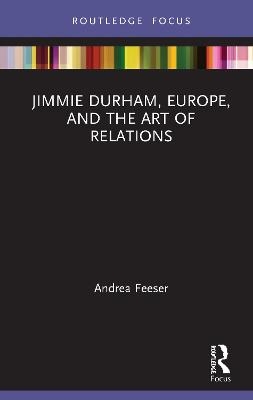
Jimmie Durham, Europe, and the Art of Relations
Seiten
2020
Routledge (Verlag)
978-0-367-40455-0 (ISBN)
Routledge (Verlag)
978-0-367-40455-0 (ISBN)
This book investigates Jimmie Durham’s community-building process of making and display in four of his projects in Europe: Something … Perhaps a Fugue, or an Elegy (2005); two Neapolitan nativities (2016 and ongoing); The Middle Earth (with Maria Thereza Alves, 2018); and God’s Poems, God’s Children (2017).
This book investigates Jimmie Durham’s community-building process of making and display in four of his projects in Europe: Something … Perhaps a Fugue or an Elegy (2005); two Neapolitan nativities (2016 and ongoing); The Middle Earth (with Maria Thereza Alves, 2018); and God’s Poems, God’s Children (2017).
Andrea Feeser explores these artworks in the context of ideas about connection set forth by writers Ann Lauterbach, Franz Rosenzweig, Pamela Sue Anderson, Vinciane Despret, and Hirokazu Miyazaki, among others. Feeser argues that the materials in Durham’s artworks; the method of their construction; how Durham writes about his pieces; how they exist with respect to one another; and how they address viewers, demonstrate that we can create alongside others a world that embraces and sustains what has been diminished.
The book will be of interest to scholars working in contemporary art, animal studies, new materialism research, and eco-criticism.
This book investigates Jimmie Durham’s community-building process of making and display in four of his projects in Europe: Something … Perhaps a Fugue or an Elegy (2005); two Neapolitan nativities (2016 and ongoing); The Middle Earth (with Maria Thereza Alves, 2018); and God’s Poems, God’s Children (2017).
Andrea Feeser explores these artworks in the context of ideas about connection set forth by writers Ann Lauterbach, Franz Rosenzweig, Pamela Sue Anderson, Vinciane Despret, and Hirokazu Miyazaki, among others. Feeser argues that the materials in Durham’s artworks; the method of their construction; how Durham writes about his pieces; how they exist with respect to one another; and how they address viewers, demonstrate that we can create alongside others a world that embraces and sustains what has been diminished.
The book will be of interest to scholars working in contemporary art, animal studies, new materialism research, and eco-criticism.
Andrea Feeser is Professor of Modern and Contemporary Art History, Theory, and Criticism at Clemson University.
Introduction. Art Exists for Us Socially
1. Art Matters: Something … Perhaps a Fugue, or an Elegy, 2005
2. Neighbors and Faith in Community: Durham’s Neapolitan Presepi, 2016 and Ongoing
3. Civilization and its Dis(Contents): Maria Thereza Alves and Jimmie Durham’s The Middle Earth, 2018
4. Animals are Our Brethren: God’s Children, God’s Poems, 2017
Conclusion. Humanity Is Not a Completed Project
| Erscheinungsdatum | 28.09.2020 |
|---|---|
| Reihe/Serie | Routledge Focus on Art History and Visual Studies |
| Zusatzinfo | 14 Halftones, black and white; 14 Illustrations, black and white |
| Verlagsort | London |
| Sprache | englisch |
| Maße | 138 x 216 mm |
| Gewicht | 453 g |
| Themenwelt | Kunst / Musik / Theater ► Kunstgeschichte / Kunststile |
| Geisteswissenschaften ► Philosophie ► Ethik | |
| ISBN-10 | 0-367-40455-9 / 0367404559 |
| ISBN-13 | 978-0-367-40455-0 / 9780367404550 |
| Zustand | Neuware |
| Informationen gemäß Produktsicherheitsverordnung (GPSR) | |
| Haben Sie eine Frage zum Produkt? |
Mehr entdecken
aus dem Bereich
aus dem Bereich


